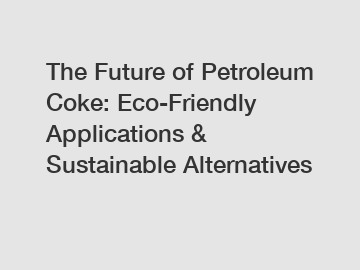The Future of Petroleum Coke: Eco-Friendly Applications & Sustainable Alternatives
The Future of Petroleum Coke: Eco-Friendly Applications & Sustainable Alternatives.
Petroleum coke, also known as petcoke, is a byproduct of the oil refining process. In recent years, there has been an increasing focus on finding eco-friendly applications for petcoke and exploring sustainable alternatives to this carbon-rich material. This article will discuss the future of petroleum coke, the potential eco-friendly applications it holds, and the sustainable alternatives that are being developed.
Eco-Friendly Applications of Petroleum Coke:

1. Energy Production:
Petcoke can be used as a fuel in various energy production processes. Its high carbon content makes it an efficient fuel source for power generation, cement kilns, and industrial boilers. However, the combustion of petcoke releases greenhouse gases, contributing to climate change. To mitigate these environmental impacts, technologies such as carbon capture and storage (CCS) can be employed to capture and store the carbon emissions.
2. Anode Manufacturing:
Petcoke is the primary raw material used in the production of anodes for the aluminum industry. Anodes are essential for the electrolysis process that produces aluminum. The carbon content of petcoke makes it an ideal material for anodes, but efforts are being made to develop more sustainable alternatives, such as carbon-neutral or carbon-free anode materials, to reduce the environmental footprint of aluminum production.
Sustainable Alternatives to Petroleum Coke:
1. Bio-Based Carbon Materials:
Researchers are actively working on developing sustainable alternatives to petcoke derived from bio-based carbon materials. These materials, derived from biomass resources, have the potential to provide a carbon-neutral or even carbon-negative alternative to petcoke. Bio-based carbon materials can be used in applications such as energy production and anode manufacturing, significantly reducing the environmental impact associated with petcoke usage.
2. Hydrogen as a Fuel Source:
Hydrogen is gaining momentum as a sustainable fuel alternative to fossil fuels. It can be produced from renewable sources and emits only water vapor when used as a fuel. Hydrogen can be utilized in various sectors, such as transportation, power generation, and industrial processes, reducing the reliance on petcoke as a carbon-intensive fuel.
Conclusion:
The future of petroleum coke lies in finding eco-friendly applications for it and developing sustainable alternatives. While petcoke can currently be utilized in energy production and anode manufacturing, efforts are being made to mitigate its environmental impact through the implementation of technologies like carbon capture and storage. Additionally, researchers are actively exploring bio-based carbon materials and hydrogen as sustainable alternatives to petcoke.
It is crucial for industries and governments to invest in research and development to accelerate the transition from petcoke to more sustainable alternatives. By embracing these innovations, we can reduce our carbon footprint, mitigate climate change, and build a more sustainable future.
In conclusion, the future of petroleum coke hinges on the adoption of eco-friendly applications and the development of sustainable alternatives. To learn more about these initiatives or discuss potential collaborations, please feel free to contact us. Together, we can pave the way for a greener and more sustainable tomorrow.
If you are looking for more details, kindly visit Metallurgical coke carburizing agent, cangshun, petroleum coke carburizing agent manufacturers.
198
0
0

Comments
All Comments (0)